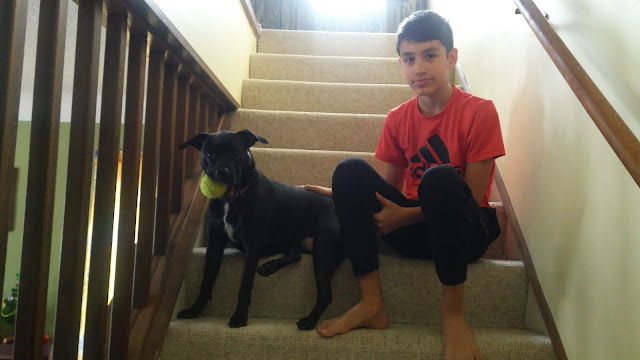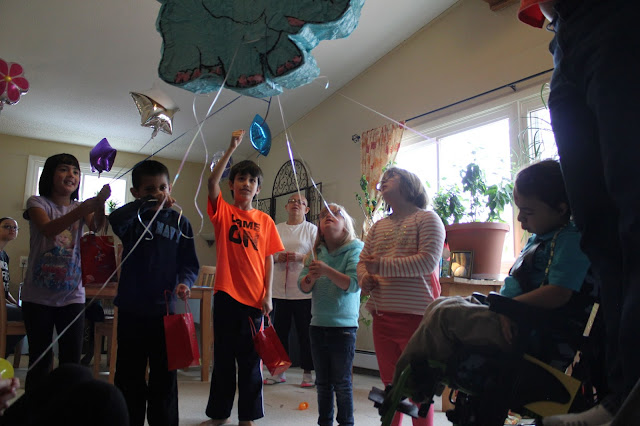Without words
We joke that we happen to have two teenagers at home, even though our first child Daniel is 12 and his brother is only 8. They are both going through bodily changes, they are both moody, and they both answer using less-than-one syllable.
"Daniel, how do you like the book?"
"Are you mad?"
"How about some eggs for breakfast?"
The answer to all my three questions is something that resembles a note from a wind instrument.
Towards the end of his elementary school years, Daniel stopped giving me long answers even if I prodded. But this is new. Suddenly, I am getting just a sound back in reply, and the grunting and huffing have not only increased, but their vowel sounds are constantly drawn out.
"Aaaaaargh!"

Language development has always amazed me. I remember Daniel as he learned to speak. Back then, bilingualism came easily to him: "Moon. Luna." Although Spanish was his first language, he quickly learned to use the language of his interlocutor to get what he wanted: "Uno, dos, tres" and "Up" meant exactly the same: "Pick me out of my crib!" Little by little the single words he learned began to come together to form phrases that often made me smile: "¡Caca no, caca no!" (I don't want to wear a diaper!); "¡Uno más, uno más!" (Breastfeed me one more time, please!). Eventually, his language became even poetic:
—Daniel, ¿ya te pusiste la piyama? ("Daniel, are you wearing your pajamas yet?")
—No. Lo que traigo puesto es una tristeza." ("No. What I'm wearing is a sadness.")
Daniel and I could hold conversations at bed time that went on and on, so it is a pity that now all I get, most of the time, is just a sound.
But a sound is not just a sound when it comes to my other son. Caleb has never said a word, and most likely he never will. Based on one pediatrician's estimate, Caleb is, developmentally speaking, four to six months of age. He is my forever baby, yet Caleb communicates.

I am even more amazed at what can be said without words. In what we have gotten to call "Calebese" (like in Portuguese), Caleb is able to tell me: "Come. I am wet. Something hurts. I am happy. I want you here with me even though it's 4:00 a.m." With the same wind-instrument-like sound his brother makes when he does not feel like talking, Caleb carries a conversation with me. Back and forth we go for a couple minutes. And even though not a word is said, I get the message.
"Daniel, how do you like the book?"
"Are you mad?"
"How about some eggs for breakfast?"
The answer to all my three questions is something that resembles a note from a wind instrument.
Towards the end of his elementary school years, Daniel stopped giving me long answers even if I prodded. But this is new. Suddenly, I am getting just a sound back in reply, and the grunting and huffing have not only increased, but their vowel sounds are constantly drawn out.
"Aaaaaargh!"

Language development has always amazed me. I remember Daniel as he learned to speak. Back then, bilingualism came easily to him: "Moon. Luna." Although Spanish was his first language, he quickly learned to use the language of his interlocutor to get what he wanted: "Uno, dos, tres" and "Up" meant exactly the same: "Pick me out of my crib!" Little by little the single words he learned began to come together to form phrases that often made me smile: "¡Caca no, caca no!" (I don't want to wear a diaper!); "¡Uno más, uno más!" (Breastfeed me one more time, please!). Eventually, his language became even poetic:
—Daniel, ¿ya te pusiste la piyama? ("Daniel, are you wearing your pajamas yet?")
—No. Lo que traigo puesto es una tristeza." ("No. What I'm wearing is a sadness.")
But a sound is not just a sound when it comes to my other son. Caleb has never said a word, and most likely he never will. Based on one pediatrician's estimate, Caleb is, developmentally speaking, four to six months of age. He is my forever baby, yet Caleb communicates.

I am even more amazed at what can be said without words. In what we have gotten to call "Calebese" (like in Portuguese), Caleb is able to tell me: "Come. I am wet. Something hurts. I am happy. I want you here with me even though it's 4:00 a.m." With the same wind-instrument-like sound his brother makes when he does not feel like talking, Caleb carries a conversation with me. Back and forth we go for a couple minutes. And even though not a word is said, I get the message.
Lately, as I lie in bed with him and I watch his smiley profile, I take in all the meaning of his smiles, his grunts, his cooing, his laughter, and his quietness. Without words, Caleb tells me so much... Daniel, too. Daniel tells me, "I am growing, mom. I am becoming my own person, separate from you." One seems to be pushing me away; the other calls me in. With just one sound.



Comments
Post a Comment